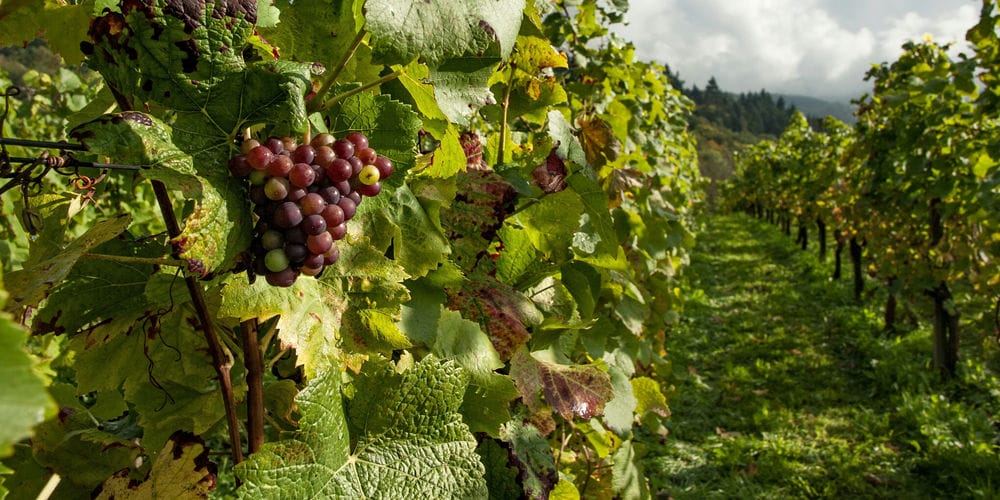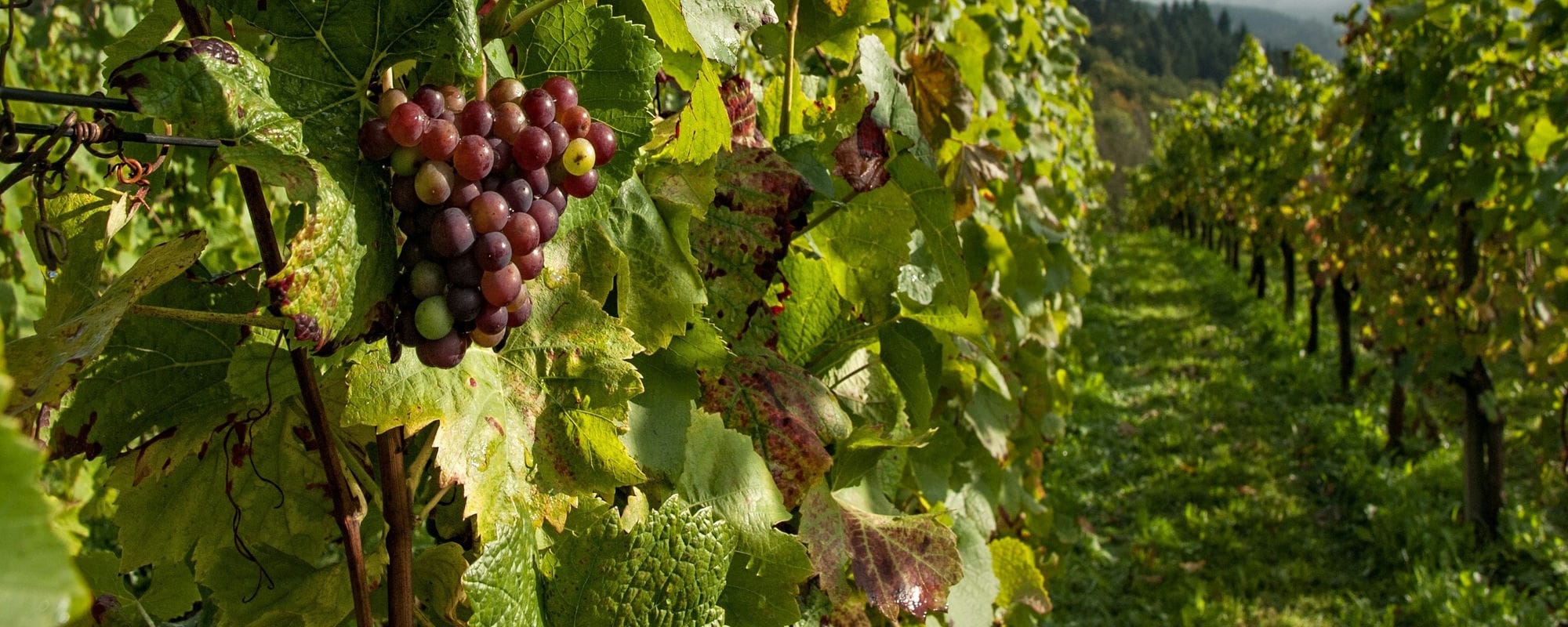
Vineyards in Greece: Nectar of the Gods Reborn
Key Takeaways
- The vineyards in Greece are many and of that high quality that justify Greece being a wine tourism haven.
- Greece's viticulture is deeply rooted in history and enriched by diverse geographical features.
- Indigenous grape varieties and traditional viticultural practices distinguish Greek wines.
- Modern innovations and sustainability initiatives are shaping the future of Greek wine production.
 Wine bottle- credits: Pixabay.com
Wine bottle- credits: Pixabay.com
Greek vineyards are home to a wide variety of grape species, many of which are indigenous and cannot be found elsewhere in the world.
This, combined with traditional farming practices, contributes to a wine portfolio that offers distinct flavors and aromas. As a result, this makes Greece rightfully haven for every wine lover in the world.
The continuing evolution of wine production in Greece, which blends time-honored techniques with modern technologies, has helped the nation secure a place on the international wine stage.
As a result, Greece has become a compelling destination for wine lovers and travelers alike, promising a rich experience of oenological discovery.
Geography and Climate of Greek Vineyards
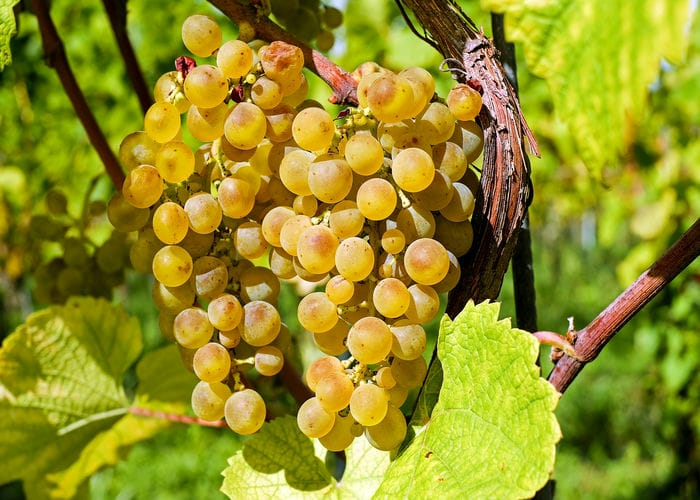 White grapes - credits: Pixabay.com
White grapes - credits: Pixabay.com
Greece's diverse geography significantly contributes to the variety of its vineyards, each benefiting from a unique climate and terroir, resulting in a mosaic of microclimates that bless the country with an array of indigenous grape varieties.
Diverse Geographical Regions
Northern Greece Vineyards: Areas such as Epirus, Macedonia, and Thrace exhibit a wetter climate, influencing vineyard conditions and grape characteristics differently from those in drier regions.
Aegean Islands Vineyards: Greek islands like Santorini and Samos are known for arid conditions, impacting grape growth and resulting in wines with concentrated flavor profiles.
Central Greece Vineyards: Regions like Central Greece, Thessaly, and Attica showcase a modulated Mediterranean climate with vineyards that experience both continental and maritime influences.
Southern Greece Vineyards: Crete, Peloponnese, and Kefalonia offer a stable Mediterranean climate that is beneficial for vineyard development and consistent grape for high quality wines.
 Red wine pour - credits: Pixabay.com
Red wine pour - credits: Pixabay.com
Mediterranean Climate Impact
Greece's vineyards thrive under a predominantly Mediterranean climate, characterized by mild, wet winters and warm, dry summers.
This climate is particularly favorable for viticulture as it promotes a lengthy growing season and stress-free maturation of grapes.
Fall, being a significant time in Greece for its mild temperatures and reduced crowds, provides ideal conditions for the harvest and visiting the vineyards, as detailed in Greece in the Fall, which also reflects on the attractiveness and mild weather of the season in the country.
Unique Terroir Influence
Soil Types: Greek vineyards offer different soil compositions, including limestone, schist, granite, and volcanic soils, each contributing distinct qualities to the grapevines and the resulting wine.
Terroir and Grapes: The interplay of soil, climate, and local grape varieties defines the terroir of each Greek wine region.
Unique grape varieties, like Assyrtyko in Santorini, are perfectly adapted to the volcanic soil and climatic conditions, showcasing the influence of terroir on the character of Greek wines.
Greek vineyards present a remarkable case study in the interrelationships between geography, climate, soil, terroir, and grape varieties, leading to an exceptional range of wines that are as diverse as the country itself.
Grape Varieties in Greek Vineyards
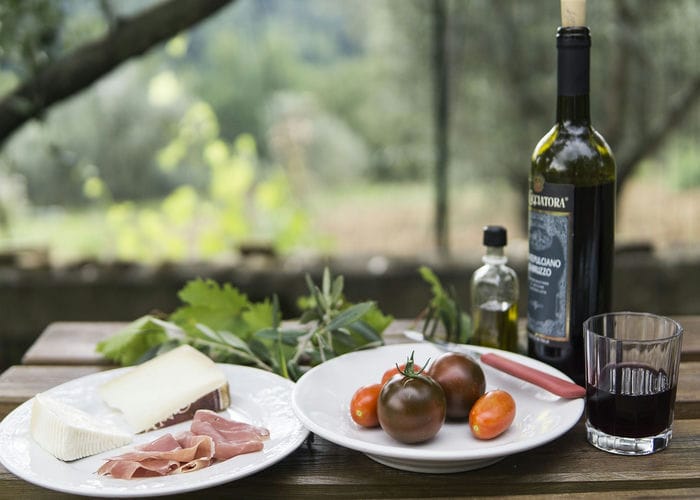 Wine-tasting - credits: Pixabay.com
Wine-tasting - credits: Pixabay.com
Greek vineyards are diversified and rich in variety, known for both indigenous and international grape types.
The country's fertile soils and diverse climate and terrain lend unique characteristics to its wine production.
Indigenous Grape Varieties
Greek wine is distinguished by its indigenous grape varieties, many of which are not found elsewhere.
Assyrtiko is one of the most renowned Greek grapes, originating from Santorini and producing wines with high acidity and a mineral profile.
Among the white wine grapes, Malvasia Aromatica stands out for its aromatic properties, especially in Crete.
- Moschofilero: Known for its grey skin, it contributes to the production of aromatic white and sparkling wines.
- Muscat of Alexandria: Adaptable to Greece's hot conditions, it yields sweet wines imbued with richness.
- Muscat of Samos: A local variety producing dessert wines with a strong aromatic presence.
Red wine varieties also display diversity:
- Moschomavro: Medium-bodied with red fruit and spice aromas Northwestern Greece
- Agiorgitiko: Soft tannins and plum notes
- Nemea Xinomavro: Robust with aging potential Macedonian regions
International Grape Varieties
Greek vineyards incorporate international varieties, which adapt uniquely to Greek terroir.
Merlot and Cabernet Sauvignon are among the reds that have found a new expression in Greece's soil and climate, producing internationally competitive wines.
For whites, winemakers have achieved notable success with:
- Sauvignon Blanc: Characterized by intense aromatic profiles, often with grass and lemon notes.
- Chardonnay: Crafted into wines that balance between freshness and body, with variable oak influence.
Regional Cultivation Variations
Grape cultivation in Greece varies significantly by region, influenced by local climates and soil types.
For instance, the cool climate of the PDO Mantineia region is conducive to the cultivation of Moschofilero, while the island of Samos offers the ideal condition for Muscat of Samos.
In terms of red wines, the high-altitude vineyards in the northwestern part of Greece are suitable for Moschomavro, and the Peloponnesian peninsula is renowned for its Nemean Agiorgitiko, often referred to as the "blood of Hercules."
Assyrtiko, on the other hand, thrives in the volcanic soil of Santorini, providing wines with a distinct minerality that is unique to local grapes used to the island.
The patchwork of microclimates and terroirs across Greece thus presents a mosaic of wine styles and expressions, with each region imprinting its signature on the grape varieties cultivated.
Vineyard Practices and Wine Production
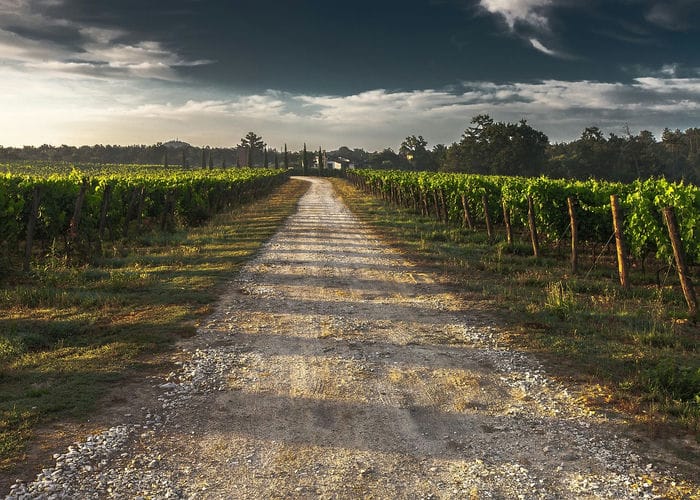 Road in a vineyard - credits: Pixabay.com
Road in a vineyard - credits: Pixabay.com
In Greece, the convergence of traditional practices and modern technology ensures a dynamic wine production process.
From the meticulous care of the vineyards to the innovative methods in vinification, Greek winemakers are both guardians of heritage and pioneers of sustainability.
Vineyard Management Techniques
The Greek landscape is nurtured with a diverse range of vineyard management techniques, ensuring that the quality of the wine begins with the health of the vines.
Organic and biodynamic practices are increasingly employed to foster sustainable growth.
Precision agriculture technologies like soil moisture sensors aid in efficient water use and contribute to the thorough care of the vineyards.
- Organic farming: No synthetic pesticides or fertilizers used.
- Biodynamic practices: Aligning vineyard activities with lunar cycles and incorporating holistic ecological approaches.
 Wine picnic - credits: Pixabay.com
Wine picnic - credits: Pixabay.com
Harvesting and Processing
Harvesting in Greek vineyards is often performed manually to maintain the integrity of the grapes, essential for high-quality wine production.
After picking, the grapes undergo careful sorting to ensure only the best fruit is processed.
Modern winemaking facilities utilize advanced machinery for destemming and crushing, preparing the grapes for fermentation with optimal precision.
- Manual picking: Ensures selective harvesting and maintains grape quality.
- Sorting: Critical for identifying the best grapes for processing.
- Destemming and crushing: Utilizes technology for consistency and efficiency.
Fermentation and Aging Processes
The fermentation process in Greek winemaking can take place in glass or stainless steel tanks, which offer temperature control, or in traditional oak barrels for added complexity.
Aging the wine varies depending on the desired outcome, with some wines benefiting from the nuances imparted by oak, while others are bottled young to preserve their fresh character.
- Stainless steel tanks: Provide controlled fermentation conditions.
- Oak barrels: Used for the aging of certain wines, imparting flavors and aiding maturation.
Wine Regions of Greece
 Wine and cheese - credits: Pixabay.com
Wine and cheese - credits: Pixabay.com
Greece's vineyards are steeped in tradition, spanning back millennia and offering a diverse range of wines influenced by the country's varied climates and terroirs.
From the sun-drenched islands to the mountainous mainland, each region contributes uniquely to Greece's wine tapestry.
Major Wine-Producing Regions
Some of the most notable wine-producing regions in Greece include:
- Macedonia: Known for Xinomavro, a red wine with bold tannins and distinct acidity, thriving especially in the region of Naoussa on soils rich in limestone and clay.
- Peloponnese: Producing a variety of wines, such as the famous Agiorgitiko in Nemea, which offers robust reds with great aging potential.
- Crete: The largest island in Greece boasts a long history of wine-making with a variety of indigenous grapes contributing to its unique oenological offerings.
- Islands: Including Santorini, with its Assyrtiko wines characterized by their minerality, high acidity, and distinctive flavor profile due to the island's volcanic soil.
Wine Folly provides further insights into the wine maps of these regions for those interested in exploring them in detail.
Distinct Regional Characteristics
The unique attributes of organic wines in each wine region are as follows:
Macedonia: Known for Xinomavro grape, producing tannin-rich reds with bolder fruit characteristics, suitable for cellar aging.
Peloponnese: Agiorgitiko wines from Nemea exhibit deep color, rich flavor, and ability to improve with age.
Crete: The island offers a diverse range of wines from indigenous varieties, reflecting the island's varied microclimates and rich soil diversity.
Santorini: Assyrtiko grape thrives in the volcanic soil, resulting in wines with a unique mineral taste and excellent aging capacity.
The islands, in general, benefit from sea breezes that moderate their warmer temperatures, providing ideal conditions for viticulture.
More about this can be learned from the Weather in Greece in August, which provides insights into the climate conditions during the peak grape-growing season.
Emerging Wine Regions
Emerging Greek wine regions gaining recognition include:
- Epirus and Thessaly: Mainland Greece regions which are producing some excellent wines from both indigenous and international grape varieties, with a focus on elevation and cooler climate vineyards.
- Ionian Islands and North Aegean: These regions are increasingly appreciated for their white and sweet wines, often derived from local grape varietals that mirror the terroir and cultural heritage.
- Cyclades and Dodecanese: Apart from Santorini, other islands are proving their worth in the winemaking scene, with labels gradually becoming more prevalent on the international market.
While they may not have the historical clout of the major regions, these areas are establishing themselves with unique profiles and dedicated winemaking philosophies.
Visitors and wine enthusiasts can explore each region to experience the distinct flavors and traditions that make Greek wines increasingly popular on the world stage.
Notable Vineyards and Wineries
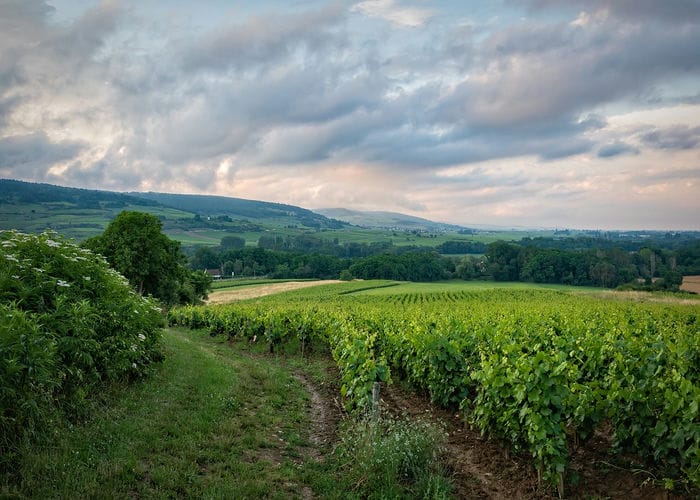 Vineyard in Greece - credits: Pixabay.com
Vineyard in Greece - credits: Pixabay.com
In the realm of Greek wines, a blend of historical providence and dedicated craftsmanship has given rise to esteemed vineyards and wineries.
They are renowned not only for their scenic landscapes and wine tastings that are always accompanied by local delicacies, but also for their unique contributions to the wine industry, each establishment offering its distinctive specialty.
Renowned Vineyards
Attica Region:
- Markou Vineyards: Steeped in tradition, these vineyards are praised for their age and artisanal methods, attesting to the historical depth of winemaking in Attica.
Peloponnese Peninsula:
- Domaine Skouras: Robust with approximately 1000 wooden barrels, this winery's aging process is integral to the refinement of its wines.
Establishment Specialties
- Skouras Winery: Experts at blending indigenous and international grape varieties, creating distinctive wines with local character.
- Lyrarakis Winery: Located on Crete, this winery specializes in local grape varieties, like Plyto and Dafni, which were saved from extinction by the Lyrarakis family.
Contributions to Wine Industry
Semeli Winery:
- This winery's role has been pivotal in showcasing the potential of Greek terroirs, particularly through the development of the indigenous grape variety Agiorgitiko.
Wine Trade:
- Greek wineries have a long-standing history in international trade, with notable sweet wines from regions like Monemvasia being historically traded extensively across Europe.
By focusing on both preserving local varietals and incorporating modern wine production techniques, Greek vineyards and wineries like those on Santorini and Crete have not only maintained their heritage but have also positioned Greek wine within the international sphere of appreciation.
Sustainability and Innovation in Greek Vineyards
 Greek white wine - credits: Pixabay.com
Greek white wine - credits: Pixabay.com
In Greek vineyards, the commitment to sustainability and innovation is becoming increasingly evident, reflecting a blend of traditional practices and modern technologies that enhance both wine quality and environmental stewardship.
Environmental Practices
Greek vineyards are increasingly focused on sustainable environmental practices.
Indigenous grape varieties play a pivotal role, as they are naturally suited to Greece's diverse climate and terrain. They require less intervention, reducing environmental impact.
Simultaneously, winemakers are embracing organic and biodynamic farming to maintain soil health and biodiversity.
These practices are not only environmentally sound but also contribute to the unique terroir expressed in Greek wines.
Technological Advancements
To bolster sustainability efforts, Greek winemakers are incorporating cutting-edge technology.
Precision agriculture tools, such as soil moisture sensors and satellite imaging, optimize water use and vineyard management, reducing waste and preserving resources.
Wine labels now often include QR codes, providing consumers with detailed information about the wine's production process and sustainability credentials, thereby fostering transparency and trust.
Sustainable Wine Production
Wine production in Greece is becoming increasingly sustainable. Wineries are adopting energy-efficient systems and renewable energy sources, such as solar panels, to minimize carbon footprints.
Waste reduction initiatives and water conservation measures are regular practices. T
he ultimate goal of these efforts is to establish a model for sustainable wine production that not only ensures the longevity of Greek winemaking traditions but also supports the overall health of the environment for future generations.
Future of Greek Vineyards and Wines
 Red wine - credits: Pixabay.com
Red wine - credits: Pixabay.com
As the Greek wine industry evolves, sustainability, innovation, and global factors shape a promising future for Greek vineyards and wines.
Growth Potential
The Greek wine industry, weathering long periods of economic challenges, has proven its resilience with the apparent doubling of wineries from 635 to 1290 between 2010 and 2018.
Given Greece’s commitment to sustainable vineyard practices, there is a positive outlook for wine tourism and expansion in both the domestic and international markets.
With land totaling approximately 64,000 hectares devoted to vine cultivation, and signs indicating a potential increase, the groundwork for growth is tangible.
Innovation and Trends
Innovation within the Greek wine industry has proven important, with many vineyards transitioning towards methods that reflect a low-intervention mentality.
As wine trends evolve, Greek winemakers are increasingly favoring the use of neutral oak in the vinification process, aligning with global preferences for subtler oak influence in wine.
Furthermore, Greek wine producers are adapting to climate considerations by implementing sustainable farming techniques and investing in research to ensure long-term viability.
Global Factors Impact
The success of Greek wines on the global stage is influenced by varying factors including weather patterns and economic fluctuations.
Greece's climate, with its characteristic mild winters as detailed in the article on Weather in Greece in January, plays a significant role in vineyard health and wine quality.
Market trends also suggest a burgeoning interest in Greek wines, potentially bolstering Greece’s position in the international wine market.
As such, Greece's wineries are becoming increasingly adept at anticipating and responding to these global factors to secure their future success.
Final Thoughts
 Wine with lunch - credits: Pixabay.com
Wine with lunch - credits: Pixabay.com
Greece offers a rich tapestry of vineyards and winemaking history dating back to ancient times.
Its diverse landscapes, from island terrains to mountainous regions, have helped to carve out a multitude of microclimates, each contributing to the unique characteristics of Greek wine.
The country's natural geography plays a pivotal role in viticulture, with Greek vineyards benefiting from the ample Mediterranean sunshine and the tempering effects of sea breezes and altitude.
Now it's your time to explore it! Bottoms up!
Frequently Asked Questions
What are some of the top-rated vineyards to visit in Greece?
Can you provide a list of notable wine-producing regions in Greece?
What types of wines are Greek vineyards most known for?
Which Greek island is renowned for its wineries and wine tours?
How does the volcanic soil of Santorini affect the wines produced there?
Are there any historic or award-winning wineries in Greece that are open to the public?











